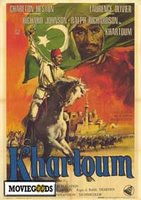Unlike other McClellan critics, the Wolseley of 1863 would occupy a series of positions to act on his analysis for the next 30 years. Some of Wolseley's combats sported that Jacksonian dash he admired - notice his campaign against Ahmed Arabi, leader of an Egyptian army revolting against its hated foreign officers (such as William Wing Loring). Other actions, less so.
Another point of interest in Wolseley's early McClellan criticism involves paradoxes. We see the strongest admirers of Lee or Jackson most often practicing the most conservative war possible - witness he modern U.S. Army, for example. Was Wolseley himself an example of this? On the other hand, the strongest admirers of McClellan's art were Lee and his generals, something we know because of Wolseley's care in recording their views while in their company. His knowledge of this appreciation fails to save him from the shallow schoolyard dichotomy of "Lee this" and "McClellan that."
 I thought I would juxtapose some of Wolseley's ACW comments with comments made about his own conduct of the Khartoum relief (speaking of "compare and contrast").
I thought I would juxtapose some of Wolseley's ACW comments with comments made about his own conduct of the Khartoum relief (speaking of "compare and contrast").Wolseley: "The federal generals hitherto have been either extremely rash, or extremely cautious and slow." (45)
Winston Churchill: "He [Wolseley] saw himself confronted with a task which was easy and safe if it were undertaken at leisure, and which was doubtful and perilous if begun in haste. All the fruits of a long and successful career were staked on the result, and it is scarcely wonderful that he declined to be swift and reckless." (Churchill, The River War)
Wolseley: "The much-admired M’Clellan is slowness and caution incarnate; vigour and promptness of action are undreamed of in his philosophy…"
Churchill: "… he [Wolseley] made his plans for a methodical and deliberate advance which would leave nothing to luck … He excluded the idea of a wild glorious rush which might result in astonishing success or terrible disaster." (Churchill, The River War)
Wolseley: "… the real power of an army rests on its ability in marching well …" (45)
Britannica: "After learning of two victories won by Wolseley's advancing forces, al-Mahdi's troops were on the verge of raising the siege; but the further unaccountable delay of the relief force encouraged them to make a final, successful assault at a gap in the ramparts caused by the falling of the Nile's waters. The city's garrison was butchered, Gordon with it." (Online encyclopedia entry)
Wolseley: "As the months of 1862 went by, the universal feeling was one of impatience and restlessness at what was deemed the waste of time and the useless delay which were taking place." (112)
 Lytton Strachey: “The delay of the expedition was even more serious than Gordon had supposed. Lord Wolseley had made the most elaborate preparations. He had collected together a picked army of 10,000 of the finest British troops; he had arranged a system of river transports with infinite care. For it was his intention to take no risks; he would advance in force up the Nile; he had determined that the fate of Gordon should not depend upon the dangerous hazards of a small and hasty exploit.” (Strachey, Eminent Victorians)
Lytton Strachey: “The delay of the expedition was even more serious than Gordon had supposed. Lord Wolseley had made the most elaborate preparations. He had collected together a picked army of 10,000 of the finest British troops; he had arranged a system of river transports with infinite care. For it was his intention to take no risks; he would advance in force up the Nile; he had determined that the fate of Gordon should not depend upon the dangerous hazards of a small and hasty exploit.” (Strachey, Eminent Victorians)Wolseley: "What most strikes the regular soldier … is the inefficient manner in which both he [Lee] and his opponents were often served by their subordinate commanders…" (64)
Churchill: "Sir Charles Wilson, [Wolseley’s subordinate] having collected his force, remained three days by the bank of the Nile before attempting any further advance on Khartoum. […] On the fourth day he embarked on two of Gordon's steamers. […] On the 27th of January the rescuers came in sight of Khartoum [two days after its storming]." (Churchill, The River War)
Wolseley: "… from a desire of leaving nothing to chance, he [McClellan] has not succeeded in anything." (46)
Edward M. Spiers: "Meanwhile British soldiers felt immensely frustrated about the outcome of the relief expedition. If they were less critical of Wolseley’s planning and staff system than some historians have been, many felt that their mission had begun too late, and that they had struggled up the Nile and defeated the Mahdi’s forces in several battles to little effect." (Spiers: The Victorian Soldier in Africa)
***
Charles Gordon: "It is, of course, on the cards that Khartoum is taken under the nose of the expeditionary force which will be just too late." (Siege journal)
(All Wolseley quotes from The American Civil War: An English View. Page numbers are in parens.)
Part 1 of this series
Part 2 of this series



